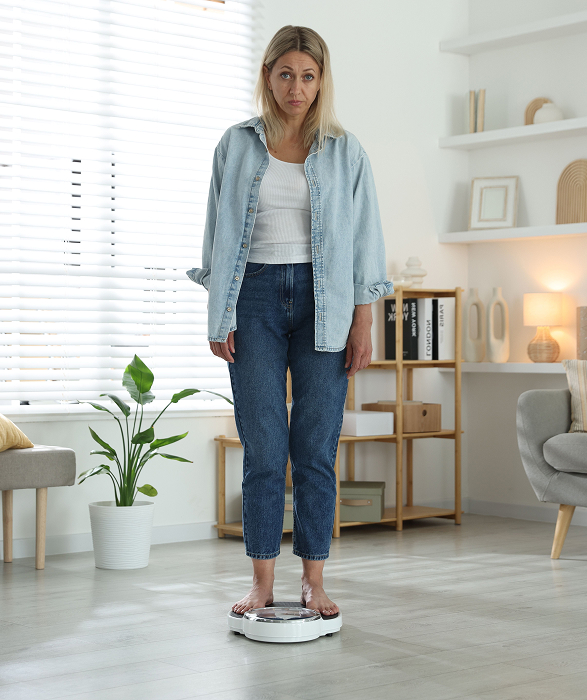Weight gain after Ozempic or Mounjaro can feel discouraging—especially after putting in the effort to lose weight in the first place. But if you’ve recently regained pounds after stopping semaglutide (Ozempic or Wegovy) or tirzepatide (Mounjaro or Zepbound), you’re not alone.
These weight loss drugs work by lowering appetite, improving carbohydrate metabolism, regulating blood sugar, and reducing cravings, but once the medication ends, those effects can fade—making it easier to regain weight even without major changes to your diet or lifestyle.
That’s why Dr. Alonso Martin often takes a different approach. For many patients, he recommends tapering to a low-dose or microdose regimen—using just 10% to 25% of the standard dose to preserve weight loss results with fewer side effects. This strategy can help maintain metabolic stability, appetite control, and even promote longevity, without returning to full-dose medication.
At BODYWELLE in Miami Beach, we guide patients through these transitions and offer long-term strategies to help them sustain results and feel in control.

You’re Not Alone. This Happens More Than People Think
If you’re experiencing weight gain after Ozempic or Mounjaro, it’s not a personal failure—it’s a known phenomenon. In fact, many clinical trials have shown that patients who discontinue these medications often regain a significant portion of the weight they lost. Known as “Ozempic rebound,” this effect isn’t due to lack of willpower. It’s about how the body responds when the medication is no longer present.
Semaglutide (Ozempic, Wegovy) and tirzepatide (Mounjaro, Zepbound) work by mimicking hormones that regulate hunger, insulin, and glucose. They help reduce appetite, improve insulin sensitivity, and slow gastric emptying. Once those drugs are stopped, it becomes harder to manage blood sugar, hunger, and cravings. Weight gain can follow quickly—especially if there isn’t a long—term plan in place.
Why Do You Gain Weight Back After Stopping Ozempic?

When you stop taking Ozempic, the medicine is no longer helping you feel full or keep blood sugar steady. Hunger and cravings come back, and your body burns fewer calories than before. That makes it much easier to regain weight — especially if you don’t keep up healthy habits.
What Exactly Happens When You Stop?
- Hunger returns: Ozempic turns down your appetite. Without it, you feel hungrier.
- Cravings get stronger: Food looks and tastes more tempting again.
- Metabolism slows: After losing weight, your body naturally burns fewer calories.
- Old habits sneak back: Without new routines for eating and exercise, it’s easy to fall back into past patterns.
What Do Studies Show About Weight Regain?
Research shows that most people gain back about two-thirds of the weight they lost within a year of stopping Ozempic. But the good news is: people who keep exercising and eating well are much more likely to maintain their weight.
Here are some evidence:
- “Weight regain and cardiometabolic effects after withdrawal of semaglutide” (STEP-1 trial extension) — shows that one year after stopping semaglutide + lifestyle intervention, people regained about two-thirds of the weight they had lost.
- “Tirzepatide Once Weekly for the Treatment of Obesity” (SURMOUNT-1 trial) — demonstrates how much weight people lose on tirzepatide vs placebo. Useful for showing baseline weight loss you’d likely lose after stopping.
- “Continued Treatment With Tirzepatide for Maintenance of Weight Reduction” — shows what happens if you don’t stop: those who stopped had major weight regain, those who continued treatment maintained or even improved loss.
How Can You Prevent Weight Regain?
- Keep moving: Do regular exercise, including cardio and strength training.
- Eat smart: Build meals with protein, fiber, and healthy fats to stay full longer.
- Get support: Work with a doctor, coach, or nutritionist if you can.
- Don’t quit suddenly: Sometimes tapering off slowly makes the transition easier.
Should I taper off instead of stopping suddenly?
In many cases, gradually reducing the dose helps ease the transition by lowering cravings and stabilizing blood sugar. Always consult your provider before making changes to your treatment plan.

Why Weight Loss With Semaglutide and Similar GLP-1 Drugs Feels Different
GLP-1 receptor agonists like semaglutide and tirzepatide don’t just help you eat less—they change how your body reacts to food altogether. Patients often report initial effects of Ozempic on appetite and weight loss such as feeling full faster, thinking about food less often, and even losing interest in sweets. These changes happen quickly, which is why weight loss can feel so easy at first.
But this type of medication-induced appetite suppression is temporary. Your natural hunger cues are muted, cravings are minimal, and blood sugar stays more stable. As a result, you eat less without trying and may even feel more energetic as blood sugar and insulin levels normalize. But when the medication ends, all of those hormonal responses begin to reverse.


Understanding Ozempic Rebound: What Happens When the Drug Wears Off
Once you stop taking Ozempic or Mounjaro, your body begins to shift back to its original state. That means:
- Appetite returns: The hormone-like effect of semaglutide or tirzepatide wears off, so your hunger and cravings may come back stronger than before.
- Metabolism slows: Rapid weight loss can cause your metabolism to drop. Without the medication, maintaining the same calorie intake often leads to weight regain.
- Insulin resistance may return: For people with prediabetes or type 2 diabetes, blood sugar levels may rise again, leading to increased fat storage.
- Cravings increase: Food may start to feel more rewarding again, which can trigger emotional or binge eating behaviors.
These changes can happen quickly, even in people who maintained a healthy diet and regular exercise routine during treatment.
Why Weight Gain Often Happens After Stopping Semaglutide or Tirzepatide
There isn’t just one cause of post-medication weight regain. It’s often a combination of physiological, psychological, and lifestyle factors. Understanding them can help you build a more realistic and supportive path forward.
From Appetite to Habits: How GLP-1 Drugs Change Your Body’s Responses
GLP-1 drugs reduce the hormone ghrelin, which signals hunger. When the drugs are stopped, ghrelin levels bounce back, and your brain starts urging you to eat more.
At the same time, many people are still recovering from the rapid fat loss triggered by the medication. Your body sees weight loss as a threat to survival, not a goal. It responds by slowing your metabolism, increasing hunger, and storing more calories as fat.
Without a strong routine or long-term plan, these biological shifts can make it nearly impossible to maintain your progress.
Emotional Eating, Cravings, and the Challenge of Staying Consistent
Many patients say their mindset changes after stopping Ozempic or Mounjaro. Once cravings return, emotional eating habits can quickly resurface. You might find yourself turning to food during stress, boredom, or fatigue without even realizing it.
GLP-1 medications blunt the reward center of the brain tied to eating. When that effect fades, food starts to feel pleasurable again. For those with a long history of yo-yo dieting, binge eating, or food addiction, this rebound can be especially hard.
Why Expectations Around Weight Loss Drugs Like Ozempic May Fall Short
Another reason for post-medication weight gain is unrealistic expectations. Many people see Ozempic or Mounjaro as a quick fix, not a medical tool. But these are not one-time treatments—they’re part of a chronic weight management plan.
Long-term use of GLP-1 medications is often recommended, especially for those with obesity, diabetes, or metabolic syndrome. In clinical trials, people who stayed on the medication maintained or continued to lose weight. Those who stopped typically regained a large portion of what they lost within a year.
This isn’t a failure of the drug—it’s simply how the body works without ongoing support.
Struggling With Weight Regain After Ozempic or Mounjaro?
Join our satisfied clients who’ve experienced safe, effective treatments.
Why Your Body Resists Weight Loss and How to Work With It
From an evolutionary standpoint, weight loss sends the body into a state of alarm. It starts fighting to regain that weight. Your brain doesn’t know you’re trying to be healthier—it only senses that something valuable (fat reserves) is disappearing.
That’s why hunger increases, energy drops, and cravings intensify. This process is known as adaptive thermogenesis, and it’s part of what makes long-term weight loss so difficult. Without medical guidance or a long-term plan, your body can easily override your intentions.

How to Stay Ahead of Weight Regain After Stopping Ozempic or Mounjaro
The good news is that weight gain doesn’t have to be inevitable. With the right tools and support, it’s possible to maintain your progress or even continue moving toward your goals. The key is to make sustainable changes that support your metabolism, hunger cues, and mental health.
Diet and Exercise Tips to Manage Weight Gain After Ozempic
Post-medication weight stability often depends on a structured routine and consistent effort. That includes:
- A balanced diet: Focus on high-protein meals, fiber-rich foods, and healthy fats to stay full and support blood sugar levels.
- Strength training and cardio: Building muscle helps keep your metabolism from dropping. Aim for 2-3 sessions of resistance training per week.
- Meal planning and prep: Reducing decision fatigue helps prevent impulsive eating and sugar cravings.
- Stress reduction techniques: Chronic stress raises cortisol, which can increase belly fat and hunger.
Even small adjustments to your food choices and habits can help prevent rapid weight gain.
Why Long-Term Weight Management Looks Different for Everyone
There is no one-size-fits-all solution for weight regain. Some patients may benefit from staying on a lower dose of medication long-term. Others may need to explore underlying issues like insulin resistance, emotional eating, or hormonal imbalance.
At BODYWELLE, we take a personalized approach. Your plan may include lab testing, body composition analysis, and tailored support that addresses your full metabolic picture. We help patients with:
- Nutrition guidance and healthy eating strategies
- Hormonal optimization when needed
- Support for building fitness routines and improving metabolic health
- Tools to reduce cravings and support better eating habits
We believe lasting results come from treating the full picture of your health, not just your weight.
If you’re struggling with cravings, rapid weight gain, or just feeling lost after stopping your medication, it’s time to ask for help. The earlier you intervene, the easier it is to reverse the pattern.
When to Seek Medical Support for Post-Ozempic Weight Gain
Dr. Alonso Martin and the BODYWELLE team specialize in weight management and regenerative wellness. We understand how medications like Ozempic, Wegovy, Mounjaro, and Zepbound interact with your hormones, metabolism, and long-term health goals.
Whether you need help tapering, reestablishing healthy habits, or exploring new treatment options, our team can guide you with experience and care.

Should You Taper Off Instead of Stopping Suddenly?
For many patients, it makes sense to gradually reduce the dose of their GLP-1 medication rather than stopping abruptly. Tapering may:
- Reduce the shock to your appetite-regulating hormones
- Prevent blood sugar spikes
- Make it easier to adapt to new eating patterns
- Minimize cravings and emotional eating
This decision should always be made with a qualified provider. At BODYWELLE, we assess your lab values, body weight, and health history to determine the safest path forward.

What to Do After Stopping Semaglutide or Other Weight Loss Drugs
If you’ve recently stopped Ozempic or Mounjaro—or are planning to—you may be wondering what comes next. The answer depends on your health goals, your symptoms, and how your body is responding.
Some people benefit from switching to another treatment like:
- Ongoing semaglutide or tirzepatide at a maintenance dose
- Nutrition and peptide-based support for hunger and metabolism
- Low-dose naltrexone or other obesity-targeted medications
- Regenerative treatments that improve metabolic efficiency
Others may benefit most from education, structure, and coaching. Our team can help you determine what makes sense for your body and your lifestyle.
Microdosing GLP-1 Medications for Weight Loss & Longevity
Microdosing involves taking very small, sub-therapeutic doses of GLP-1 receptor agonists—typically 10% to 25% of standard doses. At BODYWELLE, Dr. Martin customizes both the dosage and frequency based on each patient’s weight history, lab values, and long-term goals.
Weight Loss Benefits
- Helps maintain weight loss after full-dose treatment ends
- May continue to curb appetite with fewer gastrointestinal side effects
- Supports gradual, sustainable fat loss with better tolerability
Longevity Potential
Emerging research suggests that GLP-1 medications may offer broader health benefits beyond weight control:
- Improved insulin sensitivity and more stable glucose levels
- Reduced systemic inflammation
- Favorable effects on cardiovascular health markers
- Potential neuroprotective properties supporting brain health and aging
Dr. Martin’s microdosing protocols allow patients to transition off full-dose semaglutide or tirzepatide more comfortably. This strategy can improve compliance, reduce side effects, and provide continued metabolic support.
While microdosing is gaining interest in medical and longevity circles, it remains an off-label use and should only be pursued with proper medical supervision. At BODYWELLE, all microdosing patients undergo lab testing, personalized evaluations, and close follow-up throughout treatment.
Long-Term Solutions Beyond Weight Loss Drugs at BODYWELLE
At BODYWELLE in Miami Beach, FL, we offer comprehensive solutions for patients facing weight gain after Ozempic or Mounjaro. These include full-dose tapering, microdosing protocols, and other options tailored to your biology and lifestyle. Our practice specializes in:
- Medical weight loss programs
- Hormonal and metabolic optimization
- Lifestyle recommendations to support your fitness and nutrition goals
- Advanced treatments including peptides and exosomes to support weight and metabolic health
- Follow-up support tailored to your treatment plan
We don’t believe in one-size-fits-all medicine. Your care plan is built around your biology, your history, and your personal goals. We’re here to help you not just lose weight—but feel good in your body long after treatment ends.

Ready for Support that Actually Works? Let’s Talk
Weight gain after Ozempic, Wegovy, or Mounjaro isn’t a failure. It’s a signal that your body needs more support. At BODYWELLE, we help patients across Miami Beach and beyond reclaim control, stabilize their weight, and build habits that last.
Book your consultation today at BODYWELLE. We’re ready to help you take the next step with clarity, compassion, and real medical support.
About the Author

Dr. Alonso Martin is a renowned physician at the intersection of science, beauty, and longevity. Beginning his career at UCLA as a neuroscientist studying antioxidants’ effects on longevity, Dr. Martin now leads AM Beauty & Wellness Medspa in Miami, specializing in the latest non-invasive facial and body rejuvenation techniques. His expertise spans cosmetic dermatology, focusing on injectable neuromodulators like Botox, Daxxify, Dysport, and Xeomin, alongside an array of fillers including RHA, Juvederm, and Sculptra, to name a few. He is also adept in natural skin rejuvenation through PRF (Platelet-Rich Fibrin), stimulating collagen production and mitigating signs of aging.
Further enhancing his practice’s offerings, Dr. Martin utilizes Emsculpt NEO technology for muscle growth, tissue lifting, and fat elimination—techniques favored by NFL athletes and celebrities for strength and longevity. He passionately advocates for strengthening the body and optimizing its function as an anti-aging solution, incorporating peptide therapy to support overall wellness.
Dr. Martin trained at the University of California, Irvine Hospital in family medicine, where he treated patients of all ages with obesity, diabetes, thyroid & hormone disorders, high blood pressure, age-related diseases, chronic pain, and autoimmune conditions. With prestigious nominations like Resident of the Year at UCLA, he holds an M.D. from Michigan State University and a B.Sc. in Neuroscience from UCLA. Licensed in both Florida and California, Dr. Martin’s credentials underscore his commitment to enhancing patient well-being through advanced medical practices.
If you have any questions or would like to schedule an appointment, contact BODYWELL today by calling (305) 877-5084.